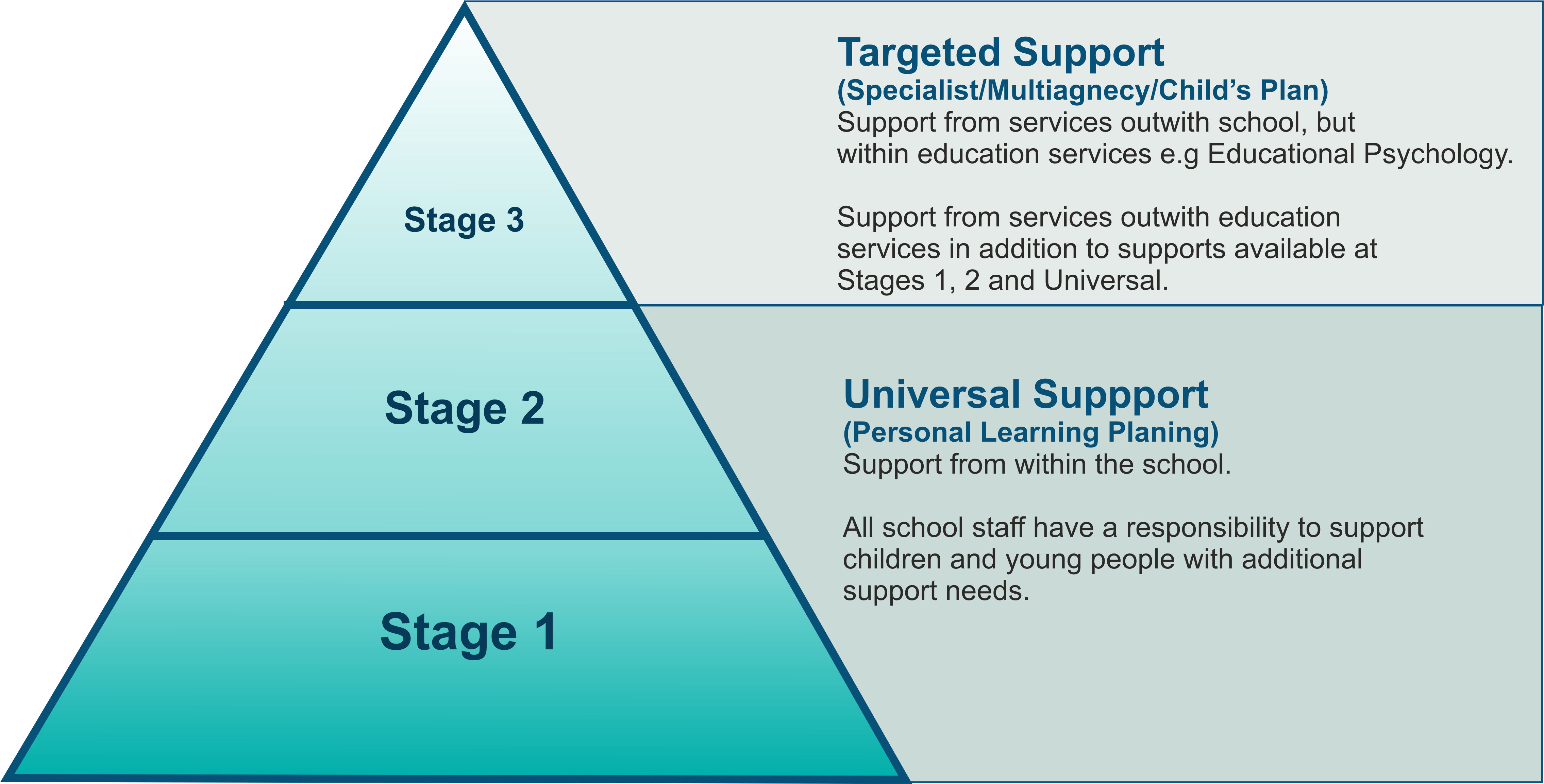Supporting and Identifying Learners' Needs
Our school education system, and the policies and legislation which support it, is designed to be inclusive and one which is based on the needs of a child or young person.
Education authorities are required to support and identify the additional support needs of each child or young person for whose school education they are responsible. The Education (Additional Support for Learning) (Scotland) Act 2004 (ASfL Act) and amendments made in 2009 provide the legal framework for assessment. However, no particular model of assessment or support is prescribed in "the Act". The 2017 Code of Practice is the accompanying statutory guidance for the ASfL Act and has been developed to help schools, parents and others to understand the Act and support its implementation.
Select 'here' to download a copy of the 2017 Code of Practice and 'here' to access the document on the Scottish Government website.
Supporting learners through personalised learning is a key focus of Curriculum for Excellence, ensuring learning, teaching and assessment is planned with the learner at the centre and that support is targeted to individual needs. This approach is supported by the ‘Getting it right for every child' approach, a key Scottish Government policy for all professionals working to support children, young people and their families.
Teachers will be supporting children and young people with a range of additional support needs and many difficulties overlap with other areas of need, referred to as co-occurrence. Teachers should work in partnership with parents and other professionals, including the full range of allied health professionals, to ensure that children's needs are appropriately identified and met.
Responsibility for all – Curriculum for Excellence
Literacy, Numeracy and Health and Wellbeing are the responsibilities of every teacher. All staff have a responsibility to develop, reinforce and extend learning in the following areas:
- Health & Wellbeing - some aspects of the health and wellbeing framework are the responsibility of all adults, working together to support the learning and development of children and young people
- Literacy - all practitioners are in a position to make important contributions to developing and reinforcing young people’s literacy skills
- Numeracy - numeracy across learning provides essential analytic, problem solving and decision making skills across the curriculum. The numeracy across learning experiences and outcomes are a subset of those found in the mathematics curriculum area.
Select 'here' for further information on the Experiences and outcomes (often called Es+Os) for Responsibility of all: Health and wellbeing, literacy, numeracy across learning.
Why focus on dyslexia to develop inclusive practice for all learners?
A frequently asked question throughout the Making Sense Programme has been:
‘Why is the focus on dyslexia and not another additional support need?'
This is because the pedagogy and approaches which can effectively support dyslexic learners are more applicable to support inclusion. Due to the broad range of characteristics experienced by dyslexic learners, which overlap with many characteristics of other neuro-developmental differences and additional support needs, this approach is beneficial and supportive to a wide range of learners.
Scotland's needs-led system places the learner at the centre and the provision of support is not dependent upon a formal label or identification of need. The assessment, support and monitoring of dyslexia should, for most children and young people, be a staged process and is called the Staged level of intervention
Staged level of intervention
All children and young people need support to help them learn and develop. The needs of the child or young person should always be central to the identification, planning and provision of support. Support should be appropriate, proportionate and timely.
All local authorities have a staged intervention and assessment process in place which enables practitioners to assess and meet learners’ needs, including dyslexia. Staged intervention:
- Helps identify, assess, plan, record and review the learning needs of children and young people. It aims to meet a child’s needs at the earliest opportunity and with the least intrusive level of intervention.
- Involves the child, parents and carers, school staff and, at some levels, other professionals, all working in partnership to get it right for every child.
Staged intervention is designed to be flexible and allows for movement between stages, depending on the support required by the learner. There are variations between local authorities regarding the number of stages within their process - the diagram below highlights 3 stages.

Children and young people with dyslexia or other literacy difficulties will generally be accommodated within the first two stages. However if there are co-occurring complex difficulties that involve services other than education services, then there may be a need to follow through to the second and perhaps third stage. Teachers should check with their own authority and ensure they keep within their own authority guidelines. Further information on educational planning can be found on the Planning and Monitoring page of this Toolkit.
